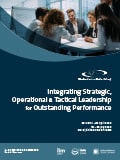An intensive professional development training course on
Managing Conflicts & Difficult Situations
Why Choose this Training Course?
The management of conflicts and difficulties is one of the most misunderstood, time-consuming and poorly handled of leadership responsibilities. Most leaders, managers and supervisors regard ‘conflict’ as something negative. However, if it is used and managed well and occurs in high-trust cultures, conflict can be a powerful source of sustainable competitive advantage. This course, as a result, has been specifically designed to help leaders and managers to control and reduce negative conflict, build high-trust organizational cultures and deal proactively with difficult situations using highly effective techniques.
The Managing Conflicts & Difficult Situations training course incorporates the latest research from the Harvard Negotiation Project, Emotional Intelligence (EI), personality research and cutting-edge communication and influencing techniques. To date these specific skills and the training approach described has been used in more than 300 of the Fortune 500 companies.
This Managing Conflicts & Difficult Situations training course will highlight:
- Your natural personality preferences for thinking, feeling, speaking and behaving that may trigger conflict – or help to manage it
- The default conflict-management strategies you use – both helpful and unhelpful
- The nature, types and causes of conflict and difficulty – inter-personal and strategic
- Highly effective strategic and verbal techniques to address conflict and difficulties at both the individual and organizational level
- How to structure your meetings, presentations and communications to reduce negative conflict and encourage healthy debate
What are the Goals?
The Managing Conflicts & Difficult Situations training course is designed to help you to:
- Identify the common types and sources of conflict in your workplace
- Appreciate your own and other’s personality profiles and preferred conflict approaches
- Understand the predictable emotional triggers and responses to conflict
- Differentiate between assertive, passive and aggressive behaviours
- Deal with difficult people and situations
At the end of this training course, you will learn how to:
- Understand the root causes of conflict in the workplace
- Determine people’s preferred conflict styles
- Adopt the most effective skills and techniques to swiftly address the issues
- Feel confident, competent and in command when handling difficult situations
- Hold those ‘crucial conversations’ with others regarding their contribution, behaviour or attitude.
Who is this Training Course for?
Leaders, managers and team leaders/supervisors who need to take charge of – and resolve – conflicts or difficult situations that could have a negative impact on performance, effectiveness and relationships. The Managing Conflicts & Difficult Situations training course would also benefit junior/middle managers new to their role, or with experience but little previous training.
How will this Training Course be Presented?
The Managing Conflicts & Difficult Situations training course will use a range of approaches to learning, including experiential group activities, individual exercises, mini-case studies, role plays and discussions. Graphical materials and stimulating explanations will be used to introduce underlying models. A key part of the learning process is sharing the different experiences you will bring to the training course, as well as experimenting with novel – and sometimes challenging – practical techniques. An MBTI-type (Myers-Briggs Type Indicator) profile will be used to give you an insight into how your personality can contribute to creating or resolving conflicts. In addition, the Thomas Kilmann Conflict Mode profile will reveal what your default conflict-management strategies are.
The Course Content
Day One: Understanding the Nature and Impact of Conflict and Difficulties
Competency Description: This first day will focus upon the nature, causes and terminology of conflict and the role of our personalities. It will also look at how conflict manifests in the workplace and how you can powerfully manage and direct the process.
Key Behaviours:
Topics to be Covered:
- Appreciating why conflict and difficulties need to be addressed proactively
- Defining the terms of reference: conflict, difficulties, competing, accommodating, etc.
- Understanding how your personality can contribute to both creating and resolving conflicts
- Recognising your default conflict-management strategies using the Thomas-Kilmann Conflict Mode Instrument
- Considering the nature, types and causes of conflict
- Identifying the common manifestations and sources of conflict in the workplace
- Using your power to positively impact others
- Ensuring that your words trigger action not reaction, and inspire rather than derail.
Day Two: Dealing with Conflicts, Difficult Situations and People
Competency Description: This second day will focus upon the nature, causes and terminology of difficult situations and problematic people both within and outside the workplace. It will also look at how to formulate the crucial conversations you need to have to address many difficulties. In addition, it will provide guidance in recognising and handling that potentially devastating 5% of any team or department – the organisational sociopath.
Key Behaviours:
Topics to be Covered:
- Considering the nature, types and causes of difficulties, e.g. emotions, relationships, behaviours, situations, performance issues, etc.
- Dealing with difficulties and issues within your organisation
- Dealing with difficulties and issues that involve your external stakeholders
- Anticipating the main kinds of difficult conversation you need to have and understanding the three sub-conversations that each consists of
- Structuring these ‘crucial conversations’ to produce optimal results
- Ensuring that you’re answering the right question in the right way
- Influencing with integrity by living your values
- Recognising that ‘1 in 20 employee’ – the Organizational Sociopath – and how to handle them.
Day Three: Building High-trust Cultures
Competency Description: This final day will focus upon understanding the nature and key elements of an organisation’s culture. It will examine the role of high-trust and low-trust cultures in contributing to conflict and difficulties and how to use strategic planning and transformational leadership to encourage healthy debate and attract the best talent to your organisation.Key Behaviours:
- Conceptualising organisational cultures
- Recognising high-trust and low-trust cultures
- Embedding organisational values
- Displaying transformational leadership
- Attracting, nurturing and retaining talent
Topics to be Covered:
- Acknowledging the public’s judgement of ‘toxic’ organizational cultures
- Understanding the key elements of your organisation’s culture
- Comparing the characteristics of high-trust versus low-trust cultures
- Identifying where and how cultures contribute to – and maintain – conflicts and difficulties
- Introducing and embedding the key elements of high-trust cultures into your organisation
- Using the power of strategic planning to establish and maintain appropriate values, operating standards and leadership behaviours
- Using Transformational Leadership to create positive conflict that stimulates and challenges current thinking and performance
- Attracting and retaining outstanding talent by making your organization a highly desirable and exciting place to work
The Certificate
- AZTech Certificate of Completion for delegates who attend and complete the course
DO YOU WANT TOLEARN MORE ABOUT THIS COURSE?
© 2024. Material published by AZTech shown here is copyrighted. All rights reserved. Any unauthorized copying, distribution, use, dissemination, downloading, storing (in any medium), transmission, reproduction or reliance in whole or any part of this course outline is prohibited and will constitute an infringement of copyright.







